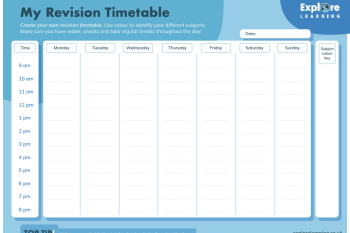How to make a GCSE revision timetable planner

Many students struggle with how to manage their time and effectively revise for their school exams and assignments and often feel overwhelmed. One way to overcome this obstacle is to create a GCSE revision timetable.
A study planner can help break subjects into more manageable chunks, organise and prioritise revision tasks and ensure students feel more in control of their revision periods.
It can be tough to balance school, work, and a social life, but it’s especially difficult to find time to revise for exams. Creating an effective GCSE revision timetable is one of the most important things a student can do to improve their academic performance and is key to acing their GCSE exams.
Benefits of an exam revision timetable
Making a GCSE revision timetable is a great way to make sure your teen is using their time effectively whilst studying for their GCSE exams. Creating a schedule and following it helps students get started with their exam revision, keeps them organised and on top of their workload, avoids the stress of last-minute cramming and ensures they are getting the most out of their study time.
How to plan and revise effectively for GCSE
Here are the recommended steps to plan a revision timetable that works for your teen…
Set goals
In order to make a revision timetable, you first need to know what your teen’s goals are. What do they want to accomplish with their revision? Once they have a goal in place, they can start figuring out what steps are needed to meet it.
Figure out how much time can be allocated to revision
How much time does your teen actually have available for study each week? You’ll need to take school, homework, coursework and social activities into consideration. From there, you can start dividing up that time into smaller chunks that will help to reach their goal.
Prioritise subjects
What subjects or particular topics within those subjects are the most challenging and should be allocated more time?
Perhaps some disappointing mock results have flagged particular focus areas, or there are subjects where a certain grade is needed to progress to the next level? Decide which subjects require the most attention, and make sure to prioritise these in the revision schedule.
Colour code subjects for a clear overview
Another useful tip is to colour code the GCSE level revision template. For each day of the week, allocate a different colour to each subject. This will help to highlight focus areas. You can also use different colours for different tasks, such as reading, highlighting and note-taking.
Another way to use colour coding is by creating different blocks of time for each subject. This will help your teen see how much time they have available for revision. They can then plan which subjects they want to revise in each block of time.
Break subjects into topics
It is important to break subjects into topics. This will allow your teen to focus on each section individually and avoid feeling overwhelmed.
Additionally, it is helpful to set smaller goals rather than trying to revise everything at once. When your teen has a mock or final exam approaching, set a goal to review one topic each day. Breaking down the material into smaller chunks will help them retain the information and feel more confident when sitting the exam.
Fill in the gaps and allocate study sessions
Next, create a schedule for each week, allocating the appropriate number of hours to each subject and topic per day; after your teen has made a note of all their other commitments. Organisation and planning ahead are key for this step.
A 30-minute revision session with a 10-minute break is the perfect combination for a successful study session.
It is super important to take breaks during revision sessions. This will help the brain process the information that it’s been studying. It’s also important that students do not spend too long on one task or topic and that their breaks include physical activities, such as exercise, in order to keep them alert and focused.
Jot down pointers for each session
Finally, make a note of what will be covered in each session. It’s important to vary what your teen is revising throughout each week, so covering and reviewing one subject a day and breaking it down into four topics – two in the morning and two in the afternoon may work best for your teen.
We’d also recommend that students devote the necessary amount of time to each topic and don’t neglect the topics they find easiest. However, as mentioned above, students should spend the most time on subjects they find most challenging.
Revision timetable top tips
If you find that your teen is struggling to keep up with their revision timetable and stick to the plan, don’t be afraid to change it. There’s no point sticking to a timetable that isn’t working for them!
Be flexible with the plan – no need to create a rigid timetable. Closer to the exams, students will want to start doing some timed past exam papers. To fit these in, they’ll have to reorganise their timetable a little, but follow the same organised method and this shouldn’t be a problem.
If the timetable is digital, print it out as well and put it in a prominent place near a study area. It will make it a lot easier to stay on track if your teen can see their plan for each day/week in front of them.
Share the timetable with friends or family. This will help to encourage and support your teen to stick with their revision schedule as closely as possible.
Revision timetable template

Discover our tuition programmes
Our Explore Learning maths and English tutors are on hand with exam tuition, covering SATs, 11 Plus and GCSE material to help students master revision techniques, boost their confidence and prepare them for exam season. You can discuss any questions you may have with our team by booking a free trial session today.
Cancel anytime
No joining fee
In centre or online
Memberships to suit you
Cancel anytime
No joining fee
In centre or online
Memberships to suit you
Cancel anytime
No joining fee
In centre or online
Memberships to suit you




